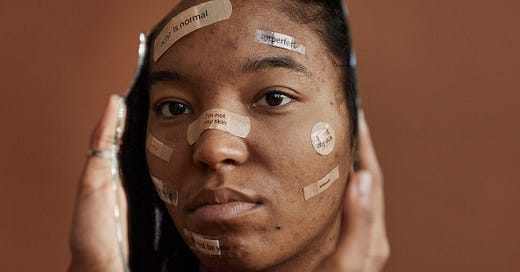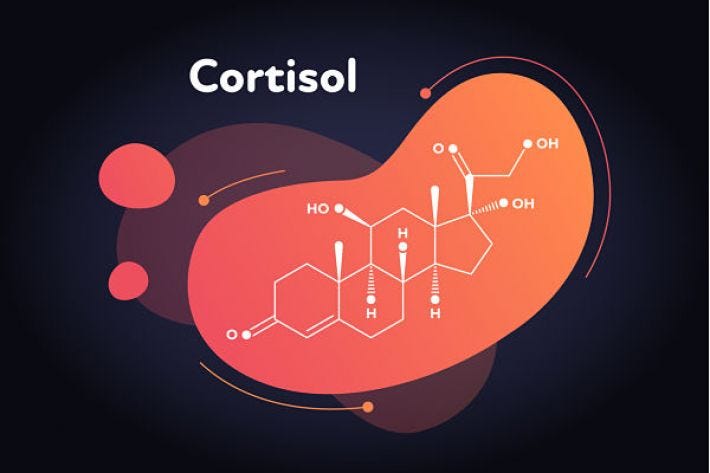What the @*/% is a cortisol face?
Debunking the diet culture buzzword and explaining cortisol's actual function in the body.
Diet culture, like many other harmful ideologies, always finds a way to morph and switch into some new trend or societal hyper-fixation. This year, it seems to be cortisol face. “Cortisol face” seems to refer to features that include rounder facial features, and have been described as “puffy” or “bloated”.
If you were to go to TikTok or Instagram reels and simply type in cortisol, you’ll be bombarded with hundreds of videos of mostly women explaining how to get rid of your “cortisol face”. I was left wondering, was this even true? So, I did some research!
So, what is cortisol?
Cortisol is a hormone that the body makes, often referred to as the stress hormone. It’s regulated by the hypothalamus, pituitary and adrenal glands (HPA axis). These glands produce and secret the hormone throughout the body.
What is cortisol’s main function?
Cortisol helps regulate your metabolism, mediate your body’s stress response, and directly affects your immune function and inflammatory response.
Dysregulation of Cortisol
Dysregulated cortisol levels usually show up in two different variations: hypocortisolism and hypercortisolism.
Hypocortisolism is when your body is not making enough cortisol, which can lead to Addison’s Disease. This is a very rare disorder and is considered an autoimmune disorder, as the cause is often due to the immune system attacking adrenal glands.
Hypercortisolism is when your body is making too much cortisol, which can lead to Cushing Syndrome. This is due to overproduction of another hormone (adrenocorticotropic) that causes the adrenals to make more cortisol then necessary. This could be due to tumors, long-term exposure to steroids, or significant physical stress.
People can have cortisol levels that are slightly higher or lower without being considered to have one of the conditions listed above. Having high cortisol also is a natural body response to stressors, however, the issue comes when those levels continue over a prolonged period of time.
So, where did cortisol face come from?
I can only assume that in someone’s quest to attain a slimmer or more chiseled face, someone else told them, “Oh! It must be your cortisol! Definitely get your cortisol checked!”. And a circus began.
Unfortunately, it is not as simple, as getting some blood work done, and having a magical cure to your stress or to your appearance.
It is true, of course, that having a more stressful and prolonged lifestyle will negatively impact your health, but I don’t feel cortisol is the evil main culprit, it’s simply a hormone. What’s really evil… perhaps the issues causing stress..?
(Cushing Syndrome would be a case where cortisol could directly impact your appearance, and though more common than Addison’s Disease, it is still considered rare and not often diagnosed.)
So, is “cortisol face” even a real thing?
In looking for scientific studies that backed the “cortisol face” phenomenon, there were few that actually said it plainly. Cortisol was often related to increased mental stress and physical health, but rarely was it studied in relation to attractiveness.
Until I found this one. A study done in 2013 with Latvian men and women, found that plasma cortisol levels were negatively associated with attractiveness, essentially meaning “stressed” women were perceived as less attractive. This, of course, is an oversimplification of the full study, which I encourage you to read on your own, but it does signal something quite interesting to me.
Is it the cortisol levels or is it the stress that people are seeing in their faces?
I think many people want to find a culprit, a specific cause they can pinpoint. The truth is as life goes on, stressors will continue. As we age, we get more responsibility, we have kids, we have jobs, there is so much that could cause stress!
Blaming it all on cortisol is not the silver bullet I think we’d all like it to be. Instead, perhaps we blame it on an increasingly difficult and expensive societal landscape we live in. (yes, this is my plug for everyone to go investigate the social determinants of health.) Life IS hard, and it’s okay to admit it affects us both mentally and physically.
I would argue the change people see in their faces is less about out of control cortisol levels, and more to do with how our bodies showcase stress.
There is no magical solve that will make you able to afford groceries, childcare, or a new car. Stress is exists, and for the vast majority of people, being stressed does not automatically mean you have a disease or disorder related to cortisol.
As many of my takes here, I end with no exact recommendations due to the problem being much bigger than just “go get your levels checked!”. I think dealing with stress has to be a bigger and more holistic approach. Starting slow, and focusing on addressing stressors that are within our control and beginning there.
And the first one I recommend to everyone: Stop letting influencers scare you into thinking there is something wrong with your face. Your face is lovely and beautiful, no matter how much it changes or stays the same.
Sources:
https://pmc.ncbi.nlm.nih.gov/articles/PMC3730635/
https://www.ncbi.nlm.nih.gov/books/NBK538239/
https://www.cedars-sinai.org/blog/what-is-cortisol.html





